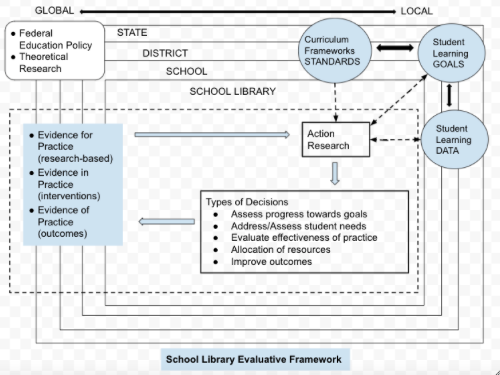As a doctoral student at Simmons University, my teachers and advisors stress the importance of choosing courses and topics for assignments that will eventually guide you toward a dissertation topic. One such assignment last year was a conceptual framework, or a visual representation of an information phenomenon underpinned by theory.
Relevant theories
Todd and Lance (Lance & Russell, 2004; Gavigan & Lance, 2015; Kachel & Lance, 2018; Lance & Kachel, 2018; Todd, 1999; Todd, 2009; Todd, 2015) have written extensively on the value of a school library and have called for more theory-based research. Lance & Russell’s (2004) recommended strategies for improving school based research still hold true:
- Elaborate conceptual frameworks;
- Replicate research to improve generalizability;
- Build on previous research. (p. 15)
Todd’s (2009) evidence-based practice and data-driven decision making model provides part of my theoretical mode, including evidence for practice (start with research-based foundation), evidence in practice (actions, results, research-based evidence), and evidence of practice (outcomes demonstrating student learning) (p. 9), stressing the importance of “local evidence [that is] deeply linked to the learning agenda of the school” (p.10). Todd (2015) outlines the specifics steps involved in systematic evidence-based practice approach in the school library and emphasizes that “evidence of practice focuses on the real results of what school librarians do, focusing on impacts, going beyond the process and activities as outputs...and establishes what has changed for learners as a result of inputs, interventions, activities, and processes and charts the...extent and quality of effect” (p. 10). This relates to Todd’s (1999) earlier paper on information utilization that also explores the idea of how groups use information to make a difference. He explains it is “about people and information coming together; it is about people ‘doing something' with information that they have sought and gathered themselves or [that was] provided by someone else” (p. 852). Placing the stages of evidence-based practice into the “Conceptual Framework of Data-Driven Decision Making in Education'' (March & Hamilton, 2006, p. 3) and centering the school library as an active place of learning with active input and output to the surrounding educational institutions and forces: school, district, and state suggested to me the idea of the theoretical framework for evaluating school libraries.
Conceptual framework
Challenges and Conclusion
The goal of this framework is to show how information can inform a school librarians’ practice and student learning outcomes by emphasizing the role of action research to inform school, district, and state practices. The model is intentionally flexible in order for it to be applied to a range of possible situations, from a single classroom to the entire district. The validity of the framework is rooted in its components: Todd’s research on evidence-based practice and the RAND corporation’s Data -Driven Decision making Model (March & Hamilton, 2006, p. 3). Including action research at the center begs the question of whether there is an alternate way to consistently gather data to demonstrate student learning in the school library.
The intention of this model is to provide a lens and framework that can be applied widely and can integrate additional theory to systematically explore, define, and illustrate learning outcomes of students in the school library. Currently, it is guiding my independent study in which I am reading school library impact state studies from the last 25 years and coding them by the elements in the model. In the end I will analyze the quantitative data to better understand trends in evaluating student learning outcomes as a result of school library programs over the last two decades. My next Forum article will summarize my findings.
Gavigan, K. & Lance, K.C. (2015). Everybody’s teacher: Administrators and teachers’ perceptions of school librarians: Findings from the South Carolina Association of School Librarians Impact Study. Teacher Librarian, 43(1), pp. 8-11.
Kachel, D.E. & Lance, K.C. (2018). Changing times: School librarian staffing status. Teacher Librarian, 45(4), pp. 14-19.
Lance, K.C. & Kachel, D.E. (2018). Why school libraries matter: What years of research tell us. Phi Delta Kappan, 99(7), pp. 15-20.
Lance, K.C. & Russell, B. (2004). Scientifically based research on school libraries and academic achievement: What is it? How much of it do we have? How can we do it better? Knowledge Quest, 32(5), pp. 13-17.
Marsh, J.A., Pane, J.F., & Hamilton, L.S. (2006). Making sense of data-driven decision making in education: Evidence from recent RAND research. RAND Education. The RAND Corporation.
Resource to support DESE model rubric system (2010). Massachusetts School Library Association.
Schultz-Jones, B. & Pasquini, L. (2019, Oct. 21-25). Research convergence: Demonstrating causal relationships between school libraries and student learning internationally. Proceedings of the 48th Annual Conference of the International Association of School Librarianship and the 23rd International Forum on Research in School Librarianship. Dubrovnik, Croatia.
Todd, R.J. (1999). Back to our beginnings: information utilization, Bertram Brookes and the fundamental equation of information science. Information Processing & Management, 35, pp. 851-870.
Todd, R.J. (2009). School librarianship and evidence based practice: Progress, perspectives, and challenges. Evidence Based Library and Information Practice, 4(2), pp. 78-96.
Todd, R.J. (2015). Evidence-based practice and school libraries: Interconnections of evidence, advocacy, and actions. Knowledge Quest, 43(3), pp. 9-15.


